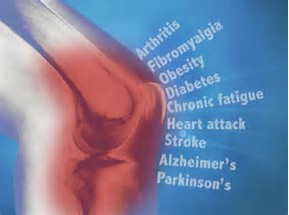Dehydration and Joint Pain
Is There a Connection?
Nancy Hearn, CNC
Note: As an Amazon Associate I earn from qualifying purchases.
The link between dehydration and joint pain is often overlooked by many people, including medical doctors and health practitioners.
Many artificial machines do not work well (or do not work at all) without adequate lubrication. Indeed, many drivers have learned the hard way that if you drive a car even a few blocks once the oil pressure gauge drops below a certain level, the engine can sustain permanent and irreversible damage.
So, it is not surprising that the same principle applies to organic machines, such as the human body. Oil lubricates moving parts in a machine, while glycosaminoglycans (GAGs) fulfill a similar purpose in the body.
GAGs combine with some other elements to make a thick, gel-like cushion between joints.
This substance is basically like a sponge, and without adequate water the sponge dries out and can no longer provide the cushioning.
Inadequate Water Intake
Not drinking enough water is the obvious culprit when it comes to dehydration. It’s not always easy to tell if you are dehydrated because many of the problems associated with this condition take a long time to develop.
The eight-glasses-of-water-a-day recommendation is a good place to start, but it is just a rule of thumb.
A better way to gauge your hydration level, albeit a rather more disconcerting way, is to examine your urine. If it is colored, has a noticeable odor, or is bubbly, you are probably dehydrated, even if the volume is high.
Other Dehydration Causes
However, drinking more water may not always be enough to reverse dehydration because there are some other contributing causes as well, including the following:
- Natural and artificial diuretics. Soft drinks, alcohol, coffee, and tea naturally remove water from the body, so reducing your intake of these beverages will improve hydration. Moreover, many people take diuretics to control high blood pressure and other health conditions. These individuals may want to speak with their doctors about alternatives, especially if they begin experiencing joint pain or other dehydration symptoms such as muscle cramps and headaches.
- Dietary factors. Many proteins contain urea, a well-known diuretic. On the other hand, beans, whole grains, and other high-fiber foods absorb water. The effect is even more pronounced with regards to fruits and vegetables. If you are already experiencing symptoms of dehydration and joint pain, you might want to add bone broth to your diet because it is a good source of GAGs and other necessary nutrients.
Dehydration and Joint Pain
Knees are one of the more prevalent joints that tend to cause pain and discomfort when someone is chronically dehydrated.
Doctors often treat dehydrated knees with Synvisc or other injections. Typically, a very large needle places this substance at the back of the knee. The procedure sounds painful, and it is painful. It’s also rather expensive and only a short-term solution.
Radical dietary changes are usually a better long-term solution, but change does not happen overnight.
If you increase your water consumption and excise poor dietary habits, the excess fluid goes first to vital organs then to under-lubricated joints.
Thus, be ready to drink lots of water, eat lots of veggies, and so on. In the meantime, to address soreness and bridge the gap, there are noninvasive treatments to prevent knee pain that are usually quite successful.
In short, improved hydration is an easy, inexpensive way to support healthy joint function and minimize various types of joint pain.
Return from Dehydration and Joint Pain to Dehydration Effects
If you would like to reproduce or republish this article or any other article on this site, feel free to do so but please include a reference or link to the article at WaterBenefitsHealth.com.
Sign Up for Our Monthly
Newsletter
Visitor Comments
"This was the best and most straight forward info on the net yet. I asked a question and got an answer that made sense. Thank you so much!" - Linderlinder
FINALLY!!! I have been wondering about this for years with no 'solid' answer. This is exactly what I've been wanting to know! Thank you for this share..." by Andy
"Thank you for the information, Nancy. I appreciate it. Your article and findings are very helpful, referring to dehydration." - Carolyn
"Lemon water is one drink both my wife and I can't drink. It upsets our stomachs. We are in our sixties and in very good health—well, better health now that we drink about 2 liters plus of water each day. It has made so much difference to our digestive systems and recovery every day. Thank you for your website and effort." - Rod



